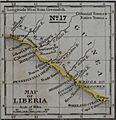John Ker (planter) facts for kids
Quick facts for kids
John Ker
|
|
|---|---|
| Born | June 27, 1789 |
| Died | January 4, 1850 |
| Education | University of Pennsylvania School of Medicine |
| Occupation | Surgeon, planter, politician |
| Title | Doctor |
| Board member of | American Colonization Society |
| Spouse(s) | Mary (Baker) Ker |
| Children | 6 |
| Parent(s) | David Ker Mary Ker |
| Relatives | Joshua Baker (father-in-law) |
John Ker (1789–1850) was an American doctor, farmer, and politician from Louisiana. In the 1830s, he helped start the Mississippi Colonization Society. This group wanted to help free Black Americans move to a new home in West Africa, which later became the country of Liberia. This society was similar to the American Colonization Society, where Ker later became a vice president.
John Ker was born in North Carolina. His father was the first president of the state's new university. Around 1817, Ker and his family moved to Mississippi. He studied medicine in Philadelphia, Pennsylvania and then returned to the South. He worked as a surgeon in the War of 1812 and the Creek War. Later, Ker owned a large cotton farm in Louisiana and served in the state's government.
Early Life and Education
John Ker was born on June 27, 1789, in Chapel Hill, North Carolina. His father, David Ker (1758–1805), was born in Downpatrick, Northern Ireland. He and John's mother, Mary, moved to the United States in the 1780s. David Ker was the first President of the University of North Carolina at Chapel Hill. This university was officially started in 1789 and opened in 1795.
Around 1817, when Mississippi became a state, John's family moved there. President Thomas Jefferson (1743–1826) chose John's father, David Ker, to be a judge on the Supreme Court of Mississippi.
John Ker received private lessons when he was young. This was a common way for children from wealthy families in the South to learn. He then traveled North to study medicine. In 1822, he earned his medical degree from the Medical School at the University of Pennsylvania in Philadelphia, Pennsylvania.
Career and Public Service
John Ker worked as a medical doctor. He was a surgeon for the U.S. Army during the War of 1812 and the Creek War (1813–1814).
Ker also became a farmer, owning a large cotton farm called Good Hope Plantation in Concordia Parish, Louisiana. This farm produced cotton using the labor of enslaved people. He also supported Oakland College, a school near Rodney, Mississippi. The college closed during the American Civil War.
In the 1830s, Ker was elected to serve in the Louisiana State Senate. During the same time, he helped start the Mississippi Colonization Society. He worked with other important landowners from Mississippi, like Isaac Ross, Edward McGehee, and Stephen Duncan. The society's main goal was to help free Black Americans move to a new colony in Africa. This colony was called Mississippi-in-Africa. The society bought land for these new settlements. Ker served as the vice-president of this group.
The Mississippi Colonization Society was based on the idea of the American Colonization Society. However, the Mississippi group focused on the issue of free Black Americans in Mississippi. In that state, there were many more enslaved people than white people. Later, Ker also became a vice president of the larger American Colonization Society. The land owned by the Mississippi Colonization Society eventually became part of the country of Liberia.
Family Life
John Ker married Mary Kenard Baker. Her father, Joshua Baker (1799–1885), later became the 22nd Governor of Louisiana in 1868. John and Mary had six children: four sons and two daughters. Their children were:
- David Ker (1825-1884)
- Sarah Evelina Ker (1826-1868), who married Richard E. Butler
- John Ker (1826-1870)
- Lewis Ker (1831-1894)
- Mary Susan Ker (1838-1923)
- William H. Ker (1841-1902)
The Ker family spent their summers at Linden. This was a large house located on the bluffs above the river in Natchez, Mississippi. Today, Linden is listed on the National Register of Historic Places. Before the Kers owned it, the property belonged to Thomas Buck Reed (1787–1829). He was a U.S. Senator from Mississippi and was related to Isaac Ross, whom Ker knew from the Mississippi Colonization Society.
John Ker was a Presbyterian. This is a type of Protestant church that was strongly connected to people from Scotland and those who moved from there.
Death
John Ker passed away on January 4, 1850.
Images for kids
 | Delilah Pierce |
 | Gordon Parks |
 | Augusta Savage |
 | Charles Ethan Porter |



